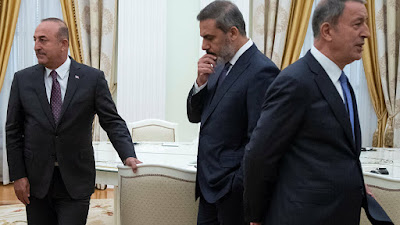
With the increasing pressure from the European Union (EU), and the growing instability in Libya, Turkey decided to shift its pursuits in the Mediterranean from western waters to south basin. Turkey is temporarily resigning from the complicated Greece/Libya front, and is seeking a new simpler battle at the Cyprus/Egypt front.
On September 13th, Turkey withdrew its seismic research ship “Oruç Reis,” which its navigation in the disputed exclusive economic zone (EEZ) between Turkey and Greece caused a lot of troubles, recently. The military tensions aroused in the Mediterranean attracted several foreign powers (e.g. France, Russia, China, and the United States), who came to take advantage of the ongoing tragedy. Pushed by France, the European Council will hold a special meeting, on September 24-25, to discuss, among other issues, imposing economic sanctions on Turkey to force it to de-escalate the tension.
Meanwhile, Turkey’s position in Libya is weakening, due to the instability and the complicated internal politics of the Government of National Accord (GNA). Turkey is the only country backing GNA against the Libyan National Army (LNA). Technically speaking, Turkey shall inevitably lose in Libya. It is standing alone, leaning on the fragile GNA, in face of a powerful regional coalition of Russia, UAE, and Egypt, which backs LNA. With the alleged coup attempt against GNA president, Fayez Al-Serraj, followed by his resignation, in mid-September, Turkey realized it has already wasted a lot of money, time, and energy on a battleground that may fruit no tangible benefits, in the near or far future.
GNA’s resigning president, Al-Serraj, is the one who signed the invalid maritime agreement with Turkey in November, last year. The so-called agreement was easily annulled by an internationally recognized EEZ agreement between Greece and Egypt, ratified in August. As a result, Turkey cannot use its defective agreement to acquire gas-drilling rights in the Mediterranean, anymore. It is not a secret that gas-drilling in the sea is the main undeclared purpose of Turkey’s intervention in Libya, from the start.
Hence, Turkey is putting the Greece/Libya front on hold, while pursuing more activities in the basin south its borders, where Cyprus and Egypt are key players. However, the flawed strategy of militarizing foreign policy, which Turkey adopted as the only strategy to handle its affairs in the Aegean Sea, would not work at the Cyprus/Egypt front. Only concentrated diplomacy could accomplish the mission. Turkey already occupies Northern Cyprus, since 1974, which gives it a limited space to conduct research or navy exercises around the divided island, without much resistance from Nicosia. On the other hand, the seven years of political rift between Turkey and Egypt needs to be addressed through wise diplomatic efforts.
Over the past two weeks, many statements were made by Turkish writers and politicians about the importance of restoring relationships with Egypt. Earlier this month, Kemal Kılıçdaroğlu of the Republican People's Party in Turkey said, in a televised interview, that “Turkey made a mistake by cutting ties with Egypt. Egypt is the door to winning in eastern Mediterranean.” Similar statements were echoed by the creator of Mavi Vatan doctrine, Retired Admiral Cem Gürdeniz, in an interview with Agence France Press. Even Erdogan’s Advisor Dr. Yasin Aktay made a video interview in Arabic, wherein he asserted the need to restore political affairs between Turkey and Egypt. Despite that, it is highly unlikely that El-Sisi’s Egypt would desire to reconcile with Erdogan’s Turkey, so easily. The rift, which Erdogan imprudently created by his support to the Muslim Brotherhood against the current regime in Egypt, is terribly wide.
Unfortunately, I strongly doubt that Turkey may succeed in its new mission in the Mediterranean. The mission requires sharp diplomatic skills and Turkey suffers from a chronic feebleness in its diplomatic bureau. Ironically, Hulusi Akar, the Defense Minister, is way more skilled in using and applying diplomatic tactics and strategies, than Mevlüt Çavuşoğlu, the Foreign Minister. Needless to mention the injudicious statements that Erdogan makes, every now and then, and their extremely negative influence on Turkey’s foreign affairs.
Perhaps, if Erdogan shuts his mouth up for a couple of months, and let wise leaders like Hulusi Akar take the lead, Turkey may have a chance to finally attain some of its lost rights in the Mediterranean. But, we know this would not happen. Erdogan loves to talk and the more he talks the more he hurts his own nation.